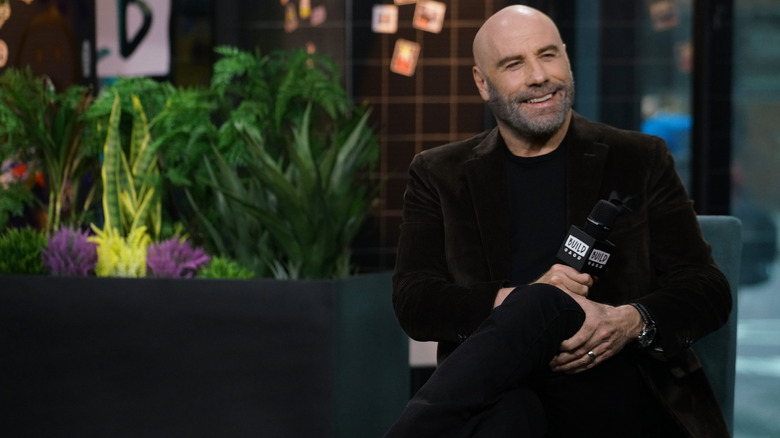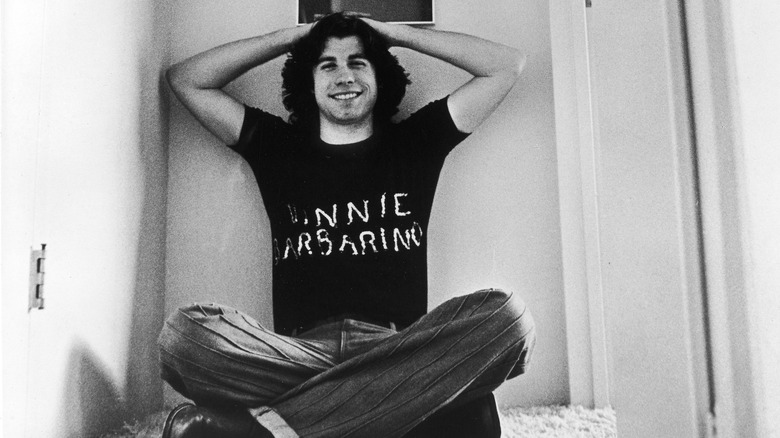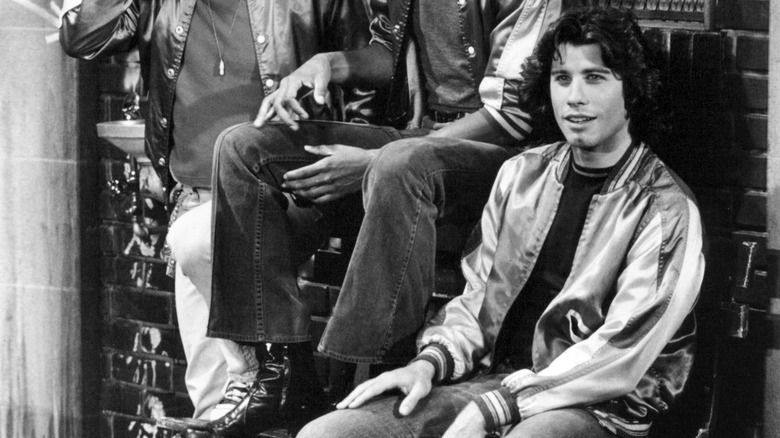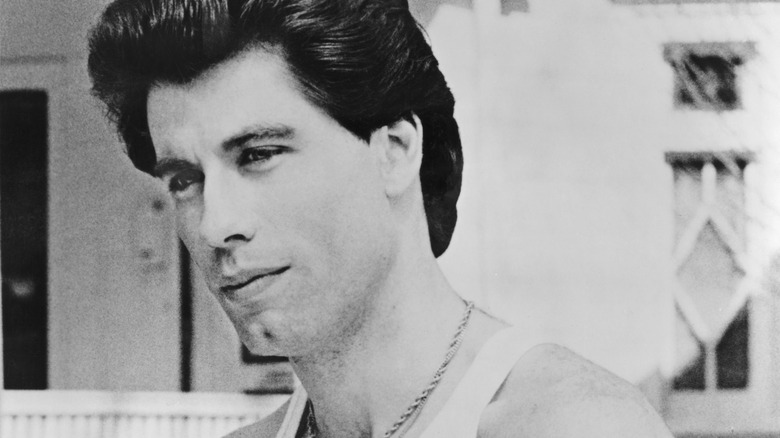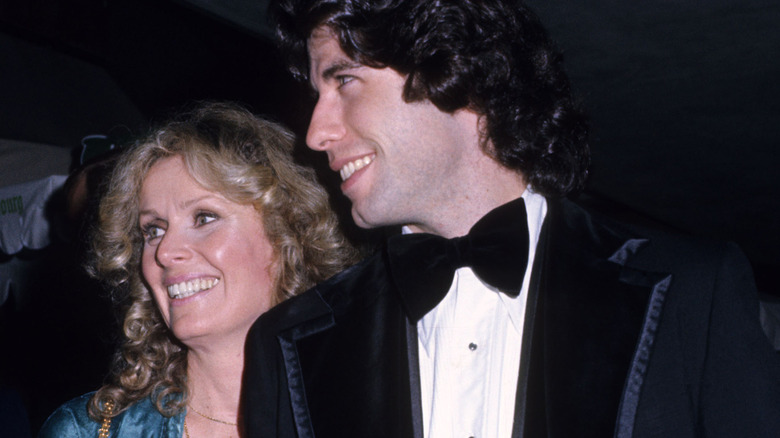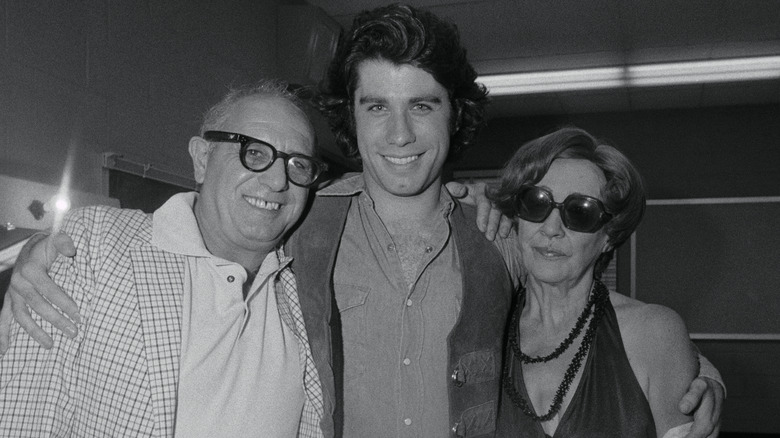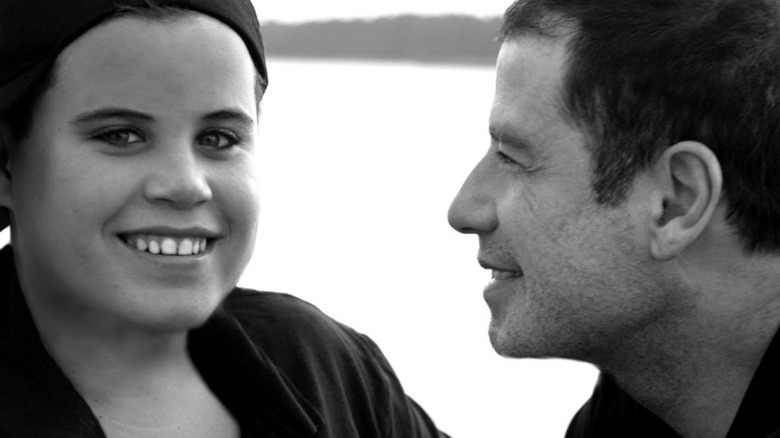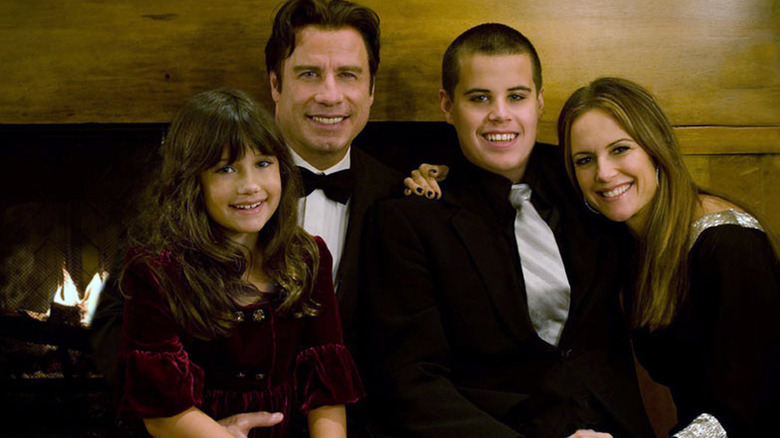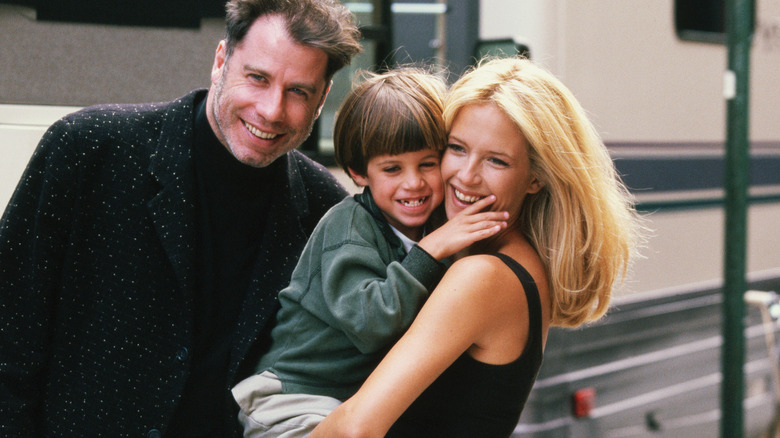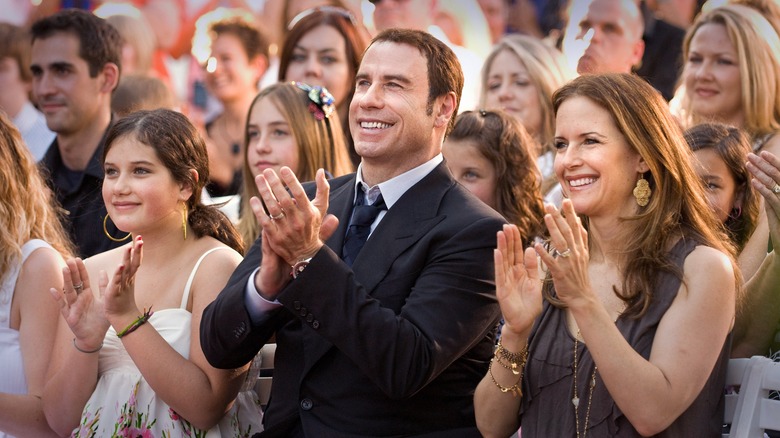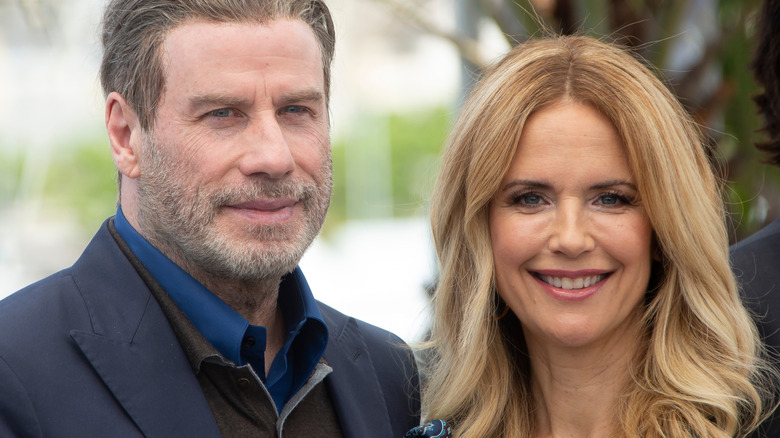Tragic Stories About John Travolta
John Travolta's career kind of reads like the opening of "A Tale of Two Cities:" "It was the best of times, it was the worst of times." There's no denying the fact that Travolta has been in some of the best, biggest, and most iconic films of his era. "Pulp Fiction?" It's a classic. "Get Shorty?" Brilliant. "Saturday Night Fever?" It defined the era of disco. And "Grease?" Well ... It's certainly iconic, as long as no one really looks too closely at it.
But then, there are some serious misses. Pointing out "Battlefield Earth" is just too obvious, because there are other, even more, dubious films — starting with the "Saturday Night Fever" sequel "Staying Alive," which is, incidentally, not only a rare 0% film for Rotten Tomatoes, but it's the first to ever be handed that not-so-coveted honor. In other words? His career has a lot in common with a kangaroo on a trampoline.
That said, his off-camera real-life has been filled with ups and downs as well — and the lows? They're really, really low. Travolta has been through a series of heartbreaking tragedies and difficulties, and they're the sort of stuff that, if they were all put into a film about the same person, would stretch belief to the breaking point.
He was bullied relentlessly in school
John Travolta didn't have the tragic home life that many stars — many people, in fact — reflect on in their adult lives ... at a glance, at least. According to Wensley Clarkson's biography "John Travolta: Back in Character," Travolta and his siblings had loving parents who were always there, protected them, and encouraged their interests. That sounds great, but Clarkson suggests that this helicopter parenting left Travolta incredibly spoiled and ill-adjusted to the world outside of his family. By the time he got to school, he paid dearly for it.
Clarkson describes a high school-age Travolta: shy, incredibly attached to his mother, academically indifferent, and socially awkward. And Travolta himself explained, "I would come home from school and I'd play a Broadway musical record instead of running to do my homework. That made me different from my peers. My reality was different from theirs. I was interested in show business, and they weren't."
Anyone who's ever met a teenager knows how outsiders are treated. For Travolta, his otherness made school a hellish nightmare, filled with bullying and name-calling that ended with him running home in tears. Although his sheltered life kick-started his interest in what would become his acting career, it also left him unable — and unwilling — to make friends his own age, being constantly suspended for various behavioral problems and suffering from severe anxiety stemming from loneliness. As Clarkson writes, his inability to "cope with anything or anyone in the outside world."
An early heartbreak impacted relationships for the rest of his life
In his biography, Wensley Clarkson says that Travolta's sheltered, spoiled upbringing also made him ill-equipped to deal with the sort of heartbreak that goes along with falling in love, growing up, and growing apart. He met his first love, Denise Wurms, when he was 13, and their friendship eventually blossomed into something more romantic. They would date for about five years. Per Clarkson, their relationship allowed Travolta to form one of his first outside-of-the-family relationships, but it didn't end as he wanted it to.
Travolta's early acting career separated the couple, as he traveled and she remained in their hometown. By the time he'd started booking commercials, he'd moved to New York City and the distance was just too much. His sister, Ellen, recalled that fateful phone call: "She told Johnny she wanted to break up with him. He was devastated."
Travolta had been doing a play in Chicago and flew home immediately. Wurms refused to reconcile, though, and Clarkson says that had such a lasting impact on Travolta that he had major difficulties not only trusting but building other relationships after the breakup. The pain was renewed when Wurms showed up to see him touring with the "Grease" musical in San Francisco. He thought they were getting back together, but instead, she wanted to tell him she was getting married. It would take him a long time to see her side of the story.
His introduction to Scientology came during a period of depression and loneliness
One of John Travola's early movies was "Devil's Rain," where he starred alongside William Shatner, Ernest Borgnine, and Tom Skerritt to tell a story about a Satanic cult. The movie's dismal Rotten Tomatoes rating perhaps reflects the idea that filming it was no picnic: In his biography, "John Travolta: Back in Character," Wensley Clarkson says that they were filming in sweltering, uncomfortable conditions in Mexico, and Travolta was in misery the whole time.
The one saving grace was that one of the supporting actresses was an old friend named Joan Prather. Prather recalled how depressed he was, explaining, "He was in need of friends. He was depressed, as was I, and we were the only two young people there, really. It was a very lonely time for him. The friends he had were using him as a doorwipe, to put it bluntly."
Prather didn't just bring friendship, she brought something else, too: Scientology. She'd been in the church for a few years, and within days, he went from not really caring in the least to being all-in. Prather said that he had gotten really, really sick with the flu while filming, and after performing a Scientology ritual called "touch assist," he told her: "This is the first time anybody's ever really helped me without wanting anything back for it." She continued, "I started showing him my Scientology books, and he just couldn't read enough of them."
He lost his girlfriend to breast cancer
John Travolta and Diana Hyland hit it off while they were filming "Boy in the Plastic Bubble," and yes, she played his mother. True love doesn't always see age, though, and they began dating in spite of the 18-year difference. She went on to "Eight is Enough," while he cemented his heartthrob status in "Welcome Back Kotter." In his biography, Wensley Clarkson revealed Travolta's promise to his sister, Ellen: "If I go into this relationship, I'm going in all the way. I'm just so scared. I don't want to be hurt again."
He was — deeply. Hyland had been diagnosed with breast cancer and had already had a partial mastectomy. Meanwhile, Travolta's career was up, up, and away. They started talking about marriage and children, and then, he was filming "Saturday Night Fever." It was during that filming that he flew back to LA, walked with her through the garden, and she died the following day. He told People, "I felt the breath go out of her."
He'd later call that period the "hardest 10 weeks of my life," and years later, in an interview with the Daily Beast, he reflected that some of that grief is in "Saturday Night Fever." He recalled filming: "My girlfriend had just passed away and I wasn't aware that I was wearing the grief of her. But in the scene where the girl kisses me on the cheek, I start to cry. Her tenderness made me cry."
His mother hid her cancer diagnosis from him
Diana Hyland passed away in March of 1977, and it wasn't long before John Travolta would be facing another devastating loss. His beloved mother, Helen, was very obviously ill by 1978, but according to Wensley Clarkson's biography, "John Travolta: Back in Character," the rest of the family had decided not to tell him that she had been diagnosed with cancer. He only learned later that even as he had been dealing with Hyland's diagnosis, illness, and ultimate passing, his mother was already aware of her own diagnosis.
She passed away in December of 1978, and Travolta was understandably devastated: He wavered in interviews and on publicity tours, and he even backed out of his next film, which was slated to be "American Gigolo." He'd later say, "I had a real dichotomy in which I had great success and at the same time, great sorrow and tragedy. A lot of people got frustrated when my grief and tragedy got publicized. They were saying, 'Because you're famous, suddenly your loss is more important than our loss.'"
He had another shock to deal with on the heels of his mother's passing: Six months later, his father married the woman who had been her nurse in the final months of her life. Although Travolta and his siblings gradually came to accept the relationship, his initial public response was to simply state, "June is a very nice lady."
He called his son's death one of the worst things that ever happened to him
Burying a child is a parent's greatest fear, and in 2009, John Travolta did just that when he and his wife Kelly Preston said goodbye to their 16-year-old son, Jett. Countless media reports told and re-told the story: Jett, who had been diagnosed with the rare disorder called Kawasaki Syndrome when he was a toddler, had a seizure while the family was staying at their vacation home in the Bahamas. He passed away after hitting his head, and the official cause of death was a seizure.
In 2014, Travolta sat down for an interview at the Theatre Royal Drury Lane and spoke about his son's death (via the BBC). "The truth is, I didn't know if I was going to make it. Life was no longer interesting to me, so it took a lot to get me better." Saying that he "didn't want to wake up," he continued: "I will forever be grateful to Scientology for supporting me for two years solid, I mean Monday through Sunday."
The Travolta family has continued to pay tribute to Jett in social media posts on his birthday. In 2019, they shared a photo of a fan-made painting along with the caption, "Happy birthday my son I love you!"
He condemned the media for the reaction to his son's death
As if dealing with the death of a child isn't hard enough, John Travolta and his family also had to deal with the mainstream media and online reaction. It wasn't kind.
In a nutshell, countless outlets used Jett Travolta's death as a way to point the finger at Travolta's devotion to Scientology and in particular, its view of modern medicine. According to Scientology's official website, practitioners are allowed to seek mainstream medical advice, but drugs are also viewed as "damaging," leading to chatter about whether or not the family had denied Jett treatment because of church teachings.
In 2017, the Daily Beast asked Travolta if the accusations, speculation, and headlines bothered him. Specifically, they were asking him about a man who had come forward claiming he'd had a long-running romantic relationship with Travolta, and he replied that there had been one time he'd really, really had a problem with the way he was treated by the media. "I found [the allegations] most offensive with the loss of my son. I felt like that was the lowest I'd ever felt. ... stay away from my family. You really should. With that, I always felt like the media — not all of the media, but parts of it — went too low there. ... The rest of the stuff I can deal with, but that one really made me question the whole thing."
He was targeted by an extortion plot
After the death of John Travolta's son, Jett, it wasn't just the fallout from the media and the internet chatter that he had to deal with. Travolta found himself in court after two people — a paramedic and a Bahamas senator — were charged in connection with allegedly attempting to extort the Travolta family for $25 million. Details, reported by The Guardian, were scant, but it was claimed that another parliamentarian and friend of the Travolta family had said "someone was doing something untoward," regarding his passing, and while that person was cleared of wrongdoing, the extortion case went forward.
Travolta had to testify at the trial, reliving the day of his son's death and his final moments. The trial dragged on and on, and it eventually ended in a mistrial when confidential information ended up on the radio. It was also revealed that the case centered around claims that Travolta refused medical treatment for his son, which he wholeheartedly denied.
After the mistrial, the case was dismissed. According to the Independent, it was Travolta who had asked for the dismissal, saying he couldn't bear to go through another trial and more testimony. His attorney stated to the court, "The Travolta family has said that this matter has caused them unbelievable stress and pain and they now wish to put this whole thing behind them."
He sees the accusations against Scientology as a tragedy
Wading into the controversy that is Scientology is a slippery slope, but let's take things at face value: It's a system of belief that John Travolta not only subscribes to wholeheartedly but that he credits for saving his life as he was going through some of the darkest times imaginable. The grief he experienced after the loss of his son, Jett, was understandably insurmountable, and he told the Tampa Bay Times, "Oh, my god, I wouldn't have made it [without Scientology]. Honestly."
The claims made about Scientology are well-known, and when "Going Clear" was released, it's safe to say that the reaction was nothing short of shock and awe. There were even claims that Scientology's power of the mind had gotten Travolta his "Welcome Back Kotter" role, and it's easy to see how that can be pretty tantalizing for believers. But what does Travolta think about it being attacked so relentlessly?
He has been upfront about how he feels about the accusations against his beloved institution, going as far as to call them a "crime." He explained: "I've been so happy with my [Scientology] experience in the last 40 years ... I've been brought through storms that were insurmountable, and [Scientology] has been so beautiful for me, that I can't even imagine attacking it. ... That would be a crime to me, personally, to do that." And no, he refused to have anything to do with or to watch "Going Clear."
His wife passed away two years after being diagnosed with breast cancer
In July 2020, one of John Travolta's representatives confirmed to People that his wife, Kelly Preston, had passed away two years after a diagnosis of breast cancer. They had been married for a long time: Travolta had proposed in 1991.
Initially asking for privacy, Travolta has since been candid about dealing with grief and loss. On an episode of Kevin Hart's "Hart to Hart," (via USA Today), he shared how difficult it had been explaining things to his 10-year-old son, Ben. Ben had confided in him that he was afraid he was going to leave as she had, and Travolta said that he'd been honest. "I said 'Ben, you have always loved the truth, and I'm going to tell you the truth about life. Nobody knows when they are going to go or when they are going to stay. ... I could die tomorrow. You could. Anybody can. ... You just do your best at trying to live the longest you can."
In an interview with Esquire, Travolta addressed the question of what he's learned about grief, and it's insightful. He explained: "I learned that mourning someone, living in mourning, is something personal. Mourning is individual, and experiencing your own journey is what can lead you to healing." Travolta has continued to post tributes to her on his social media, including a 2021 Mother's Day post that read, in part, "We love and miss you. Happy Mother's Day."
